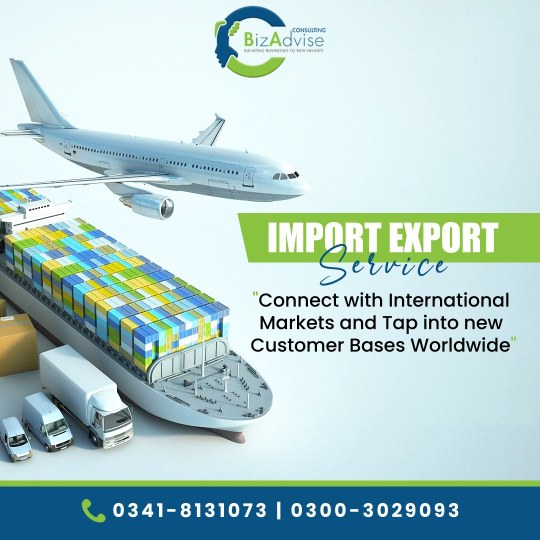Don't wanna be here? Send us removal request.
Text
Title: Navigating the Requirements of Import/Export Business: A Complete Guide
Embarking on an import/export business journey entails navigating a maze of regulations, documentation, and procedures. Understanding and fulfilling the necessary requirements is essential for smooth operations and compliance with legal standards. In this guide, we'll explore the key requirements of import/export business, covering aspects such as licenses, documentation, and customs procedures. #import #export #business
Licensing and Registration
1. Obtain an Import/Export License
Before engaging in import/export activities, businesses typically need to obtain an import/export license or permit from the relevant government authorities. The requirements for obtaining these licenses vary depending on the nature of the goods being traded and the countries involved. It's essential to research and comply with the licensing requirements specific to your industry and jurisdiction. #import #export #business
2. Register with Customs Authorities
Businesses engaged in import/export activities are required to register with customs authorities in their home country. This registration process involves providing detailed information about the business, including its legal structure, ownership, and intended import/export activities. Registration with customs authorities enables businesses to receive necessary permits, clearances, and access to customs facilities.#import #export #business
Documentation Requirements
1. Commercial Invoice
A commercial invoice is a crucial document in import/export transactions, detailing the goods being shipped, their value, and terms of sale. It serves as a legal document for customs clearance, payment processing, and compliance with trade regulations. Ensuring accuracy and completeness in commercial invoices is essential to facilitate smooth customs clearance and avoid delays or penalties. #import #export #business
2. Bill of Lading (B/L) or Airway Bill (AWB)
The bill of lading (B/L) or airway bill (AWB) is a shipping document that serves as a contract between the exporter and the carrier. It provides details about the goods being transported, the terms of shipment, and the destination. The B/L is used for shipments transported by sea, while the AWB is used for air shipments. These documents are essential for tracking shipments, transferring ownership, and claiming goods upon arrival at the destination port or airport. #import #export #business
Customs Procedures and Compliance
1. Tariff Classification and Valuation
Import/export businesses must accurately classify their goods according to the Harmonized System (HS) code, a standardized system used for classifying traded products. The HS code determines the applicable customs duties, taxes, and regulations for imported and exported goods. Additionally, businesses must correctly value their goods for customs purposes, ensuring compliance with valuation rules and avoiding under or overvaluation issues. #import #export #business
2. Customs Duties and Taxes
Import/export businesses are subject to customs duties, taxes, and fees levied by customs authorities on imported and exported goods. These duties and taxes vary depending on factors such as the nature of the goods, their country of origin or destination, and any preferential trade agreements in place. Businesses must understand and factor in these costs when pricing their goods and conducting import/export transactions. #import #export #business
Conclusion
Navigating the requirements of import/export business involves careful planning, documentation, and compliance with legal standards and regulations. From obtaining the necessary licenses and registrations to preparing accurate documentation and complying with customs procedures, import/export businesses must fulfill a range of requirements to ensure smooth operations and compliance with trade regulations. By understanding and adhering to these requirements, import/export businesses can mitigate risks, streamline operations, and unlock opportunities for growth and success in the global marketplace. #import #export #business

follow our FB page https://www.facebook.com/bizadviseconsultancy
0 notes
Text
Title: Meeting the Requirements of a Private Limited Company: A Comprehensive Guide

Establishing a private limited company entails fulfilling specific requirements mandated by the governing authorities. These requirements ensure compliance with legal standards and create a structured framework for the company's operations. In this guide, we'll delve into the essential requirements of a private limited company, covering aspects such as formation, governance, and ongoing compliance. #privatelimited #company
Formation Requirements
Forming a private limited company involves several steps and prerequisites to ensure its legal existence and operations. Here are the key requirements: #privatelimited #company
1. Memorandum of Association (MOA) and Articles of Association (AOA)
The Memorandum of Association outlines the company's objectives, powers, and scope of activities. It serves as the company's constitution and must be filed with the Registrar of Companies (ROC) during the incorporation process. The Articles of Association, on the other hand, define the rules and regulations for the internal management and administration of the company. #privatelimited #company
2. Minimum Capital Requirement
While many jurisdictions no longer mandate a minimum authorized capital for private limited companies, some may still require a nominal amount to be specified in the MOA. This capital represents the initial investment in the company and is often symbolic. #privatelimited #company
3. Registered Office Address
A private limited company must have a registered office address within the jurisdiction where it is incorporated. This address serves as the official correspondence address for the company and must be specified in the incorporation documents filed with the ROC.
Governance Requirements
Once formed, a private limited company must adhere to certain governance requirements to ensure proper administration and compliance. Here are the key governance requirements:
1. Appointment of Directors
A private limited company must have at least one director, who may also be a shareholder. Directors are responsible for the management and decision-making of the company. The appointment and removal of directors must comply with the company's Articles of Association and relevant legal regulations. #privatelimited #company
2. Shareholder Meetings
Private limited companies are required to hold annual general meetings (AGMs) to discuss matters such as financial statements, dividend declarations, and appointment of auditors. Additionally, extraordinary general meetings (EGMs) may be convened as needed to address specific issues requiring shareholder approval. #privatelimited #company
3. Maintenance of Statutory Registers and Records
Private limited companies must maintain various statutory registers and records as required by law. These include registers of members, directors, and charges, as well as minutes of shareholder and board meetings. Compliance with record-keeping requirements is essential to demonstrate transparency and accountability. #privatelimited #company
Ongoing Compliance Requirements
In addition to the formation and governance requirements, private limited companies must fulfill ongoing compliance obligations to maintain their legal status and good standing. Here are some key compliance requirements:
1. Annual Filings
Private limited companies are required to file annual returns with the ROC, providing details such as financial statements, shareholding structure, and changes in directorship. Failure to file annual returns within the stipulated timeframe may result in penalties and consequences for the company and its officers. #privatelimited #company
2. Tax Compliance
Private limited companies must comply with various tax obligations, including filing tax returns, payment of corporate taxes, and compliance with goods and services tax (GST) regulations where applicable. Engaging qualified tax professionals or consultants can help ensure accurate and timely tax compliance. #privatelimited #company
3. Regulatory Compliance
Private limited companies must adhere to relevant regulatory requirements applicable to their industry or sector. This may include obtaining licenses, permits, or approvals from regulatory authorities and complying with specific regulations governing their operations.
Conclusion
Meeting the requirements of a private limited company is essential for ensuring legal compliance, effective governance, and ongoing operations. From formation prerequisites to governance and compliance obligations, private limited companies must adhere to a range of statutory requirements to maintain their legal status and credibility. By understanding and fulfilling these requirements, private limited companies can establish a solid foundation for growth and success in the business world. #privatelimited #company
1 note
·
View note